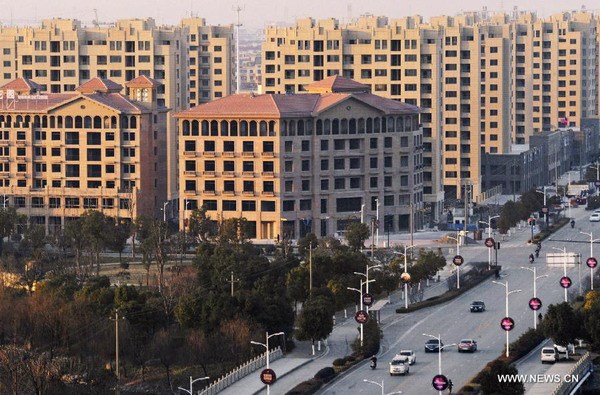
Photo taken on Jan 1, 2015 shows an apartment project in Huzhou, East China's Zhejiang province. (Photo/Xinhua)
The expiry of land use rights for urban houses is now a hot topic of discussion, as the majority of the people want the land use rights to be renewed for free. But legislation demands that a reasonable fee for extending land use rights be charged for the renewal.
The Property Law talks about "automatically renewing" land use rights, which tends to indicate "unconditional" renewal. But if land use rights could be "unconditionally" renewed for free, why did legislators bother to stipulate the time limit for it? More importantly, automatic free renewal of land use rights is equal to permanent ownership of land, which would turn land use rights into property rights and would be a drain on State-owned assets.
The drafters of the Property Rights said the original intention of "automatically renewing" is not "renewal for free". What it means is that homeowners don't have to queue up again to get their land use rights renewed.
The fundamental basis for charging a fee for renewal is that land belongs to the State. China's unique land system makes it difficult for those versed in regular property rights theory to understand the issue in its entirety, and hence the controversy.
China's Constitution says that urban land belongs to the State. It could be further interpreted as: "once non-State-owned land is incorporated into urban areas during the process of urbanization, it will belong to the State".
The Law of Land Administration says that only State-owned land can be used for construction of buildings. The only exception is land collectively owned by farmers, which could be used by farmers to construct buildings, but they will remain non-tradable. The law does not allow farmers to build housing units on their land to sell it to others or people to "buy" rural homestead from farmers to construct residential units.
Land collectively owned by farmers, even if it is used for constructing buildings, cannot be traded directly, unless the farmers first sell the land to the government to change it to State-owned land.
The stipulation simply means that in China, ownership is restricted to State-owned land, making it the most economically valuable land. The State-owned land system also makes local governments the only "wholesalers" of land for construction, encouraging them to demand high land-transfer fees. The uniqueness of China's State-owned land system makes it different from traditional property ownership.
All this eventually leads to an unfair market situation: homebuyers in China pay a much higher price than their counterparts in many other countries to own land use rights but still their possession is for a limited period and they have to pay a fee for renewing it.
As the wholesalers of land for construction, local authorities collect huge amounts of fees from land sales. And since local authorities already levy heavy taxes on land while transferring the land use rights, homeowners are against paying the tax the governments intend to levy after they get possession of their homes.
China has 12 taxes and various other fees related to real estate, which place a heavy burden on homebuyers. Besides, it is unfair to impose the same types and rates of taxes on all homeowners irrespective of whether they purchase housing units for residential purposes or for speculation. In fact, it is this skewed arrangement that could lead to speculation.
However, nowadays local governments cannot earn huge revenues from land sales or transfer of land use rights, which means they will very probably levy taxes on the home owners sooner or later. To guarantee basic fairness, at least the existing commercial residential housing units should not be charged a fee for renewing their land use rights.
Yang Junfeng, the author, is a research scholar at the School of Law, Chinese People's Public Security University.


















































